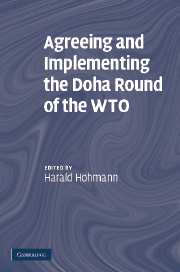Book contents
- Frontmatter
- Contents
- List of Contributors
- Foreword
- Introduction
- The future of the Doha Round
- PART ONE Development policy of the WTO
- PART TWO Trade policy (including competition) and trade facilitation
- PART THREE Reform of the dispute settlement system
- PART FOUR Social rights, health, and environment
- 15 Trade and human rights at work: Next round please …? Regulatory and cooperationist approaches in the context of the Doha Round
- 16 Food safety issues under WTO Agreements
- 17 Trade and the environment: With particular reference to climate change issues
- 18 Live with a quiet but uneasy status quo? An evolutionary role the appellate body can play in resolution of ‘trade and environment’ disputes
- 19 Health, environment and social standards in the Doha Round: Comparison of visions and reforms needed and the results achieved
- PART FIVE Conclusions
- Index
18 - Live with a quiet but uneasy status quo? An evolutionary role the appellate body can play in resolution of ‘trade and environment’ disputes
from PART FOUR - Social rights, health, and environment
Published online by Cambridge University Press: 23 February 2010
- Frontmatter
- Contents
- List of Contributors
- Foreword
- Introduction
- The future of the Doha Round
- PART ONE Development policy of the WTO
- PART TWO Trade policy (including competition) and trade facilitation
- PART THREE Reform of the dispute settlement system
- PART FOUR Social rights, health, and environment
- 15 Trade and human rights at work: Next round please …? Regulatory and cooperationist approaches in the context of the Doha Round
- 16 Food safety issues under WTO Agreements
- 17 Trade and the environment: With particular reference to climate change issues
- 18 Live with a quiet but uneasy status quo? An evolutionary role the appellate body can play in resolution of ‘trade and environment’ disputes
- 19 Health, environment and social standards in the Doha Round: Comparison of visions and reforms needed and the results achieved
- PART FIVE Conclusions
- Index
Summary
Introduction
How is it possible to reconcile trade liberalization with environmental protection? This is among the most urgent questions facing the new trade round negotiation, the Doha Development Agenda, of the World Trade Organization (WTO). In particular, the issue of the permissibility of process-and-production-method-(PPM-) based trade measures under the WTO law is the most difficult and controversial one afflicting WTO lawyers. The problem can be described in a nutshell: can a trade ban on a product imposed because of the fact that the PPM of that product is harmful to the environment be consistent with WTO law?
The purpose of this chapter is to trace what the panels and the Appellate Body of the WTO have done in settlement of disputes concerning the above problem and to think about a possible evolutionary role that the Appellate Body can play in resolution of “trade and environment” disputes.
In order to do this, the chapter first considers generally the essential characteristics of the problem of so called “trade and environment” and then identifies a special problem which is raised by these characteristics in the context of the dispute settlement system of the WTO (II). Second, on a more substantial level, this chapter will consider what a trade related environmental measure (TREM) based on a PPM is and will then identify the issues of its possible inconsistency with the WTO law (III). Third, we will trace how the panels and the Appellate Body have disposed of these issues in practice and also make some analysis of a new approach adopted by the Appellate Body in interpreting the WTO law in two recent cases (IV).
- Type
- Chapter
- Information
- Agreeing and Implementing the Doha Round of the WTO , pp. 420 - 437Publisher: Cambridge University PressPrint publication year: 2008
- 1
- Cited by



